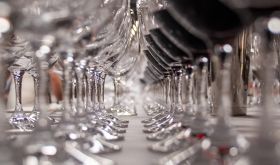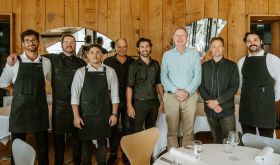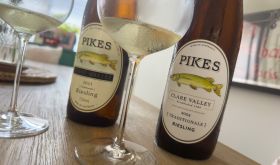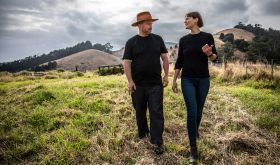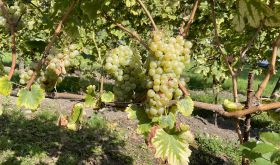I left Vietnam for Paris in 1968 and had not returned since then. I arrived in Hanoi very early morning on 20 March to cook a special meal at the French embassy to celebrate the forty-fifth anniversary of French–Vietnamese diplomatic ties.
The first thing I did was to stroll around the embassy area to see a little of the neighbourhood. On Tran Hung Dao street were dozens of small food stalls with many people having breakfast standing or squatting before heading to work. I had been walking for 15 minutes when, coming from an alley, a delicious smell of Pho stopped me. I could not help ordering a bowl, even though I had already had breakfast at the embassy. I ate on the pavement, sitting on a very uncomfortable stool at a low table. The taste of the soup and long-lost memories overwhelmed me and were telling me, ‘Welcome back home’.
The following day, Van Anh and Sylvain Bournigault, epicures and wine merchants, took us for a late lunch, at my request to the best Pho in town. We went to Ly Quoc Su. The shop is small, simple, and we ate outside at a low table on stools on the pavement opposite railway arches painted with many contemporary artworks that I liked very much. Strangely (for us) we had to order drinks from the stall next door. They had run out of raw beef.
The bowls were enormous, the broth very strong with the right balance of the different spices, super-concentrated (probably because we were the last customers and it had time to reduce) and very flavourful with penetrating and persistent marine aromas. I wondered whether they had made it with dried earthworms – Sa Sung – as my grandmother, who was from Ha Dong, told me about 60 years ago and we do not have available in France? The cooked beef was thickly sliced, very tasty and abundant while the noodles were soft, thin, tender, very silky on the tongue (much more so than the ones we find in Europe ). On another plate were the lime, chili, coriander, mint and sawtooth coriander.
I always have a kind of ritual when I eat Pho that I have cooked. (I could not do so in Hanoi because I wanted to totally experience the local genuine soup without interfering with the process.) I eat two small bowls and never a big one. For the first one I have just the broth, the noodles and the cooked meat. For the second one I put cooked and thinly sliced raw beef (it changes the clarity and the taste of the soup ), then gradually add the onions, herbs, chili etc and a little lime only for the last three spoonfuls. I always taste successively the broth, the noodles, the beef, and then I mix the ingredients together on my spoon three times. (I was surprised to see metal spoons in Hanoi as in China.) Then I eat the noodles very quickly for them not to swell and lose their original texture. This is also the reason why I prefer two small bowls to one big one.
My uncle Chau who is from Nam Dinh told me that the best and original Pho is to be found in his home region. I am sure next time I travel in Vietnam I will go to Nam Dinh to eat Pho.
We are not sure how, when or where Pho was created, whether it has links to the French pot au feu or to Chinese noodles, but I was thrilled by all the Phos I had in Hanoi because of the atmosphere, the heartiness, the sincerity and the generosity of the people who make, sell and eat it.






